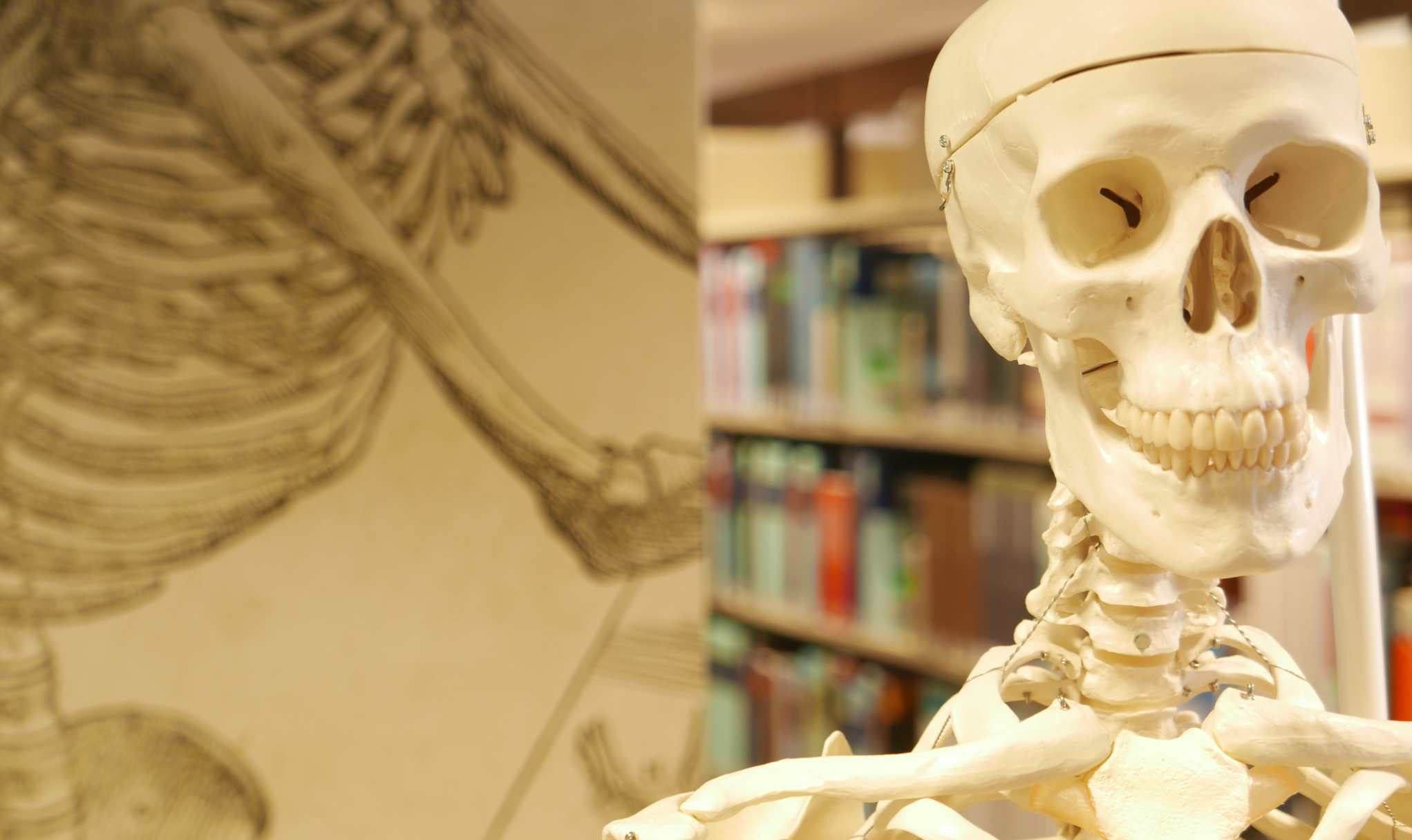Learn the basic steps of a reference, and you can hit the rhythm with any style you need.
Referencing – why is it snow important?

When walking in the snow we need the right footwear, and to keep warm, a scarf, hat, and gloves are also of great help. By doing so, we are adapting to the environment and using the right tools at the right time for the job at hand.
The same is true when adapting to academic writing where referencing is a key tool.
When you are writing a piece of work and you use someone else’s thoughts, words or ideas, you must reference them. But why do we talk about referencing so much at University, and why is it so important? Why should you bother spending time on ensuring that your references are consistent, accurate and correct?
It all comes down to why we reference in the first place:
- To make your contribution clear by showing which words and ideas are yours, and which have come from your reading.
- To acknowledge the work of others and to demonstrate how you have built on the knowledge that you’ve gained from your reading.
- To ensure that the reader can follow up on your references for themselves.
- To avoid being wrongly accused of plagiarism.
Watch our short video to find out a little more about why we should bother with referencing.
Find out more on our Managing Information skills guide.
Routine for Referencing

What are the key steps to a successful routine for referencing? Of all the enquiries we get in the Library, referencing is the most common.
Referencing is the acknowledgement of the sources that you use in your work. You must reference all sources that you use in your assignment, project or dissertation, including words and ideas, facts, images, videos, audio, websites, statistics, diagrams and data.
Over the next two weeks weeks we’re focusing on referencing, giving you the routine for success. As a novice, you might need a little help to understand the steps and techniques for your referencing style.
We’ll tell you where to get advice and help
Understand why we reference and how
How to avoid plagiarism
How to manage your information to make your life easier and assignments less stressful, giving you the routine for success.
Walton Library: Reading Lists and the STC
Hopefully you are feeling settled at the Walton Library and finding your way around. During your induction session you may have heard Library staff mention reading lists and STC books. This blog post breaks these terms down to help you get the most out of the Library.
What are reading lists?
When it comes to reading lists, the clue is in the name. They are materials your lecturer(s) have selected to help you understand your subject – and are not necessarily books! Reading lists can contain journal articles, websites and other media, such as podcasts and videos. The material on your reading list is broken down into essential, recommended or background reading for your convenience.
Not all reading lists look the same. Some lists are divided into the above categories, and some are divided into weekly or even daily reading. Speak to your lecturer if you have a query about the content on your module’s reading list.
Where are they?
There’s more than one way to access your reading list. If you use the Medical Learning Environment (MLE), you can access your reading list from the “Reading” tab on the “Learning Materials” window. These are embedded in each Case. See below for reference:

You can click on the items within the reading list and it’ll take you directly to Library Search, where you will be able to see the item’s location and availability.
If you use Blackboard, once you’ve logged in, you will see that the “Reading Lists” link is on the “Overview” page for each module you’re registered on. See below for reference:
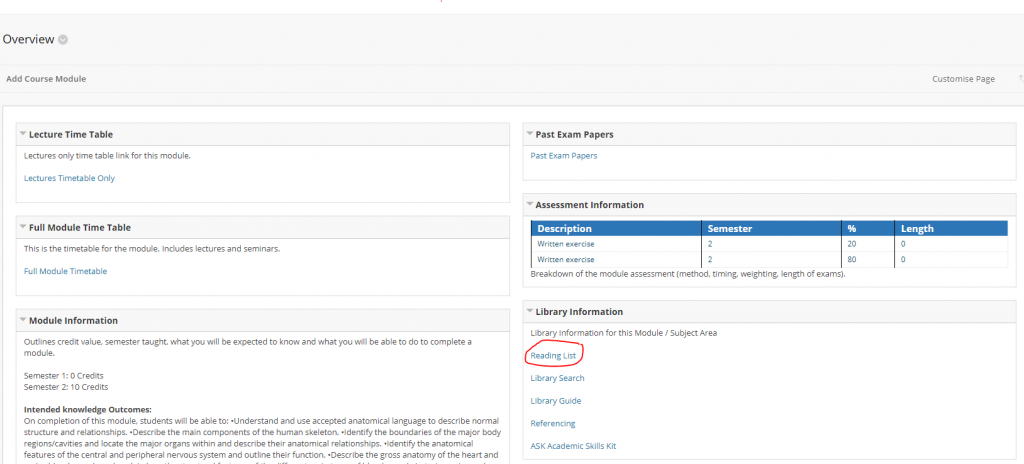
You can also access your reading lists from the Library homepage. Follow this link and click the green “More information for students” button.
If you’re having a technical problem when using your reading list, email: med-reading-lists@ncl.ac.uk and we’ll investigate the problem for you.
What is the STC?
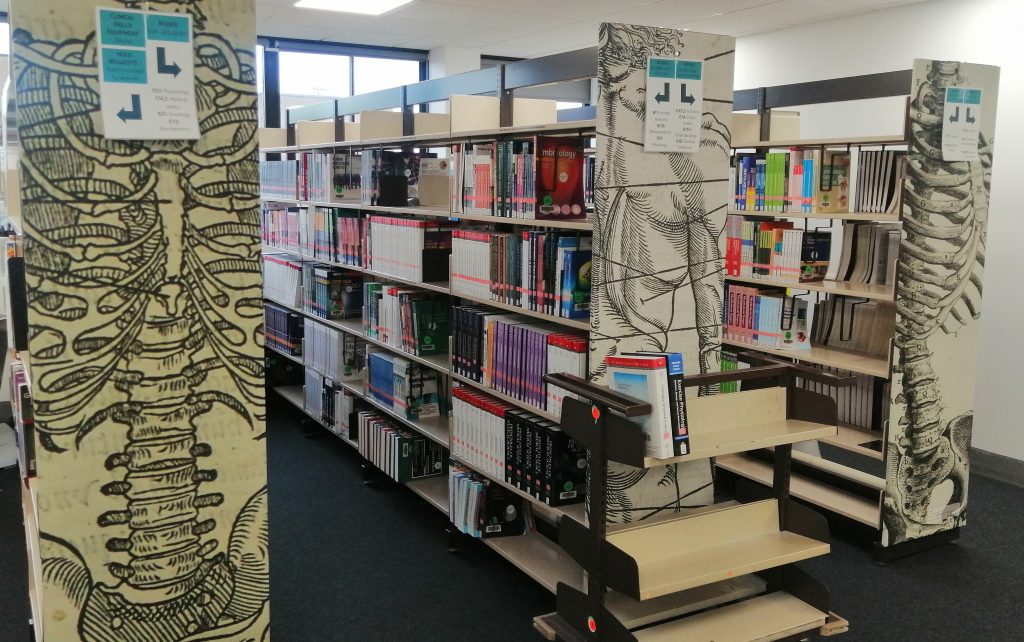
If you’ve been to the Walton’s service desk asking for a stapler, you may have heard the staff directing you to the STC. STC or Student Texts Collection is a separate room, located next to the printers and the self-issue machine, which contains our high demand texts. Many of these will be essential on your reading lists. These books are available for short loan only – four hours during the day, unless you take them out four hours before the Library closes, when you can loan them overnight (providing you return them before 9:30AM the next weekday and 10:30AM on weekends!)
These short loan books are perfect if you’re on the go. You can issue one before a lecture and then return it just after! They’re also ideal if you only need to use a short section of a book: you can copy up to one chapter or 10% of a book (whatever is greater) using the photocopier.
How does it work?
Just like long loan items, STC books are on Library Search. However they can’t be reserved if all the copies are out on loan. STC books need to be checked out and returned from your account using the self-issue machine in the STC room.
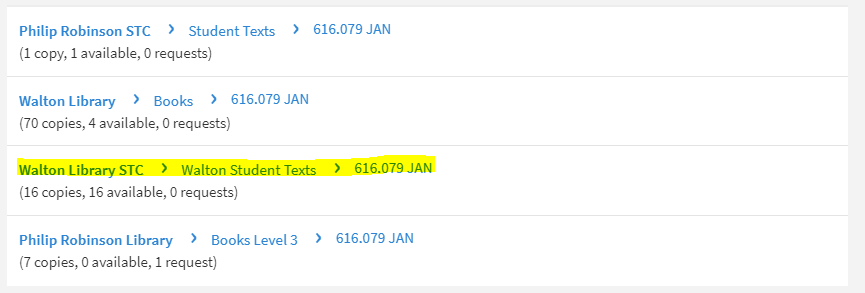
If you have any further queries about the STC, you might want to check out our Library FAQs here. Desk staff at the Walton can also be called upon to lend a hand if you’re stuck.
Mobile Apps & Resources Guide

Our mobile devices are great for helping us to stay in touch with friends and family, keeping us up-to-date with the latest trends and news on social media and, of course, for sharing cat videos.
However, your mobile device can also be a great tool for learning and study, if you’ve got the right apps!
With recommendations from students in SNES, (who have been using tablets on their course for the past year) our updated Mobile Apps and Resources Guide provides a host of freely available apps and mobile friendly resources that can help you get the most from your device. It includes apps for study and productivity, creativity and design, history, languages, business, science and more.

So whether you’re just getting set up with your tablet or an old hand looking for something new to help keep you organised with your work or up-to-date in your subject area, our guide has something to help.
Some highlights include:
Microsoft Office Lens – this app helps you make documents or pictures of whiteboards screen readable. You can also use Office Lens to convert images to PDF, Word and PowerPoint files.
Pocket – allows you to save articles, videos and stories from any publication, page or app to read at a later time.
Trello – a useful tool that helps you to organize and prioritize your projects using boards, lists and cards.
BrowZine – a tool that allows you to access and keep up to date with key journal titles that the Library subscribes to in your subject area.
If you have any further suggestions for useful apps that we could add to the guide, let us know at: lib-sage@ncl.ac.uk
Thieme Science of Synthesis (SOS) trial
We have trial access to Thieme Science of Synthesis (SOS) from now until the end of the year.
Are you looking for critically-reviewed, synthetically-relevant and readily-applicable methods with detailed experimental procedures to support your research projects?
To start getting to the synthesis quicker, try Thieme Science of Synthesis (SOS), a full-text resource for evaluated methods in synthetic organic chemistry.
There is no need to login as you will be recognized automatically by IP address during the trial. However, you can register for a personal account by clicking on “MySoS” in order to save searches and results lists.
Click the “Training & Support” button in the top menu to find case studies, author lists and further help. There is a quick start guide and video tutorials to support you.
We would like to know how this resource supports your research, assessed work and teaching, so please send any comments to Julia Robinson, Faculty Liaison Librarian for chemistry.
Freshers’ Guide to the Walton Library
Wishing a Warm Walton Welcome to all new and continuing students in the new academic year!
Just as you are settling into life at University we thought that you might benefit from this list of tips of how to make the most out of your time in the Walton Library.
The Library opening hours change throughout the year, but during term time, we are open normally until 22:00.
Resources
Use your Reading Lists as a great starting point for finding academic material. They can be accessed via your VLE (Virtual Learning Environment), which is either Blackboard or the MLE, depending on the course you are studying.
All academic resources that we purchase will be available via Library Search. It is the most prominent element on our colourful website and it will show you books, articles, journals in both physical or electronic format, databases and others.

Use keywords to find the titles that you need and Library Search will tell you whether we have them or not, whether they are available on the shelves, in which library and part of which collection they are. If a book we have in stock is NOT currently available on the shelves, the best thing you can do is to log in with your student ID and password and place a reservation:
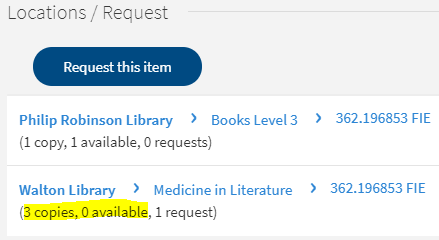
Reserving is in your best interest because this is what will prompt a current reader of the book to bring it back so that you can use it. So remember: Shy bairns get nowt.
Specialist help
There are subject-specific guides that give you information directly relevant to your course. You can find them by selecting your course in Subject Support, on the Library website.

Want to ask us a question?
Library Help is the place you seek. You can browse our FAQ database by topic or search it by using keywords. You can also send us an email or chat with us. Library Chat is monitored 24/7, so as long as you have access to the internet, wherever you are in this great, big world, you can contact us.
Finding theses from elsewhere
Although the Library holds copies of all Newcastle University PhD theses and copies of theses written for other research degrees, you may find you need a thesis from elsewhere. If this is the case, our Theses and Dissertations guide is a good place to start. This tells you what print and electronic theses we hold and where to find other UK or international theses.
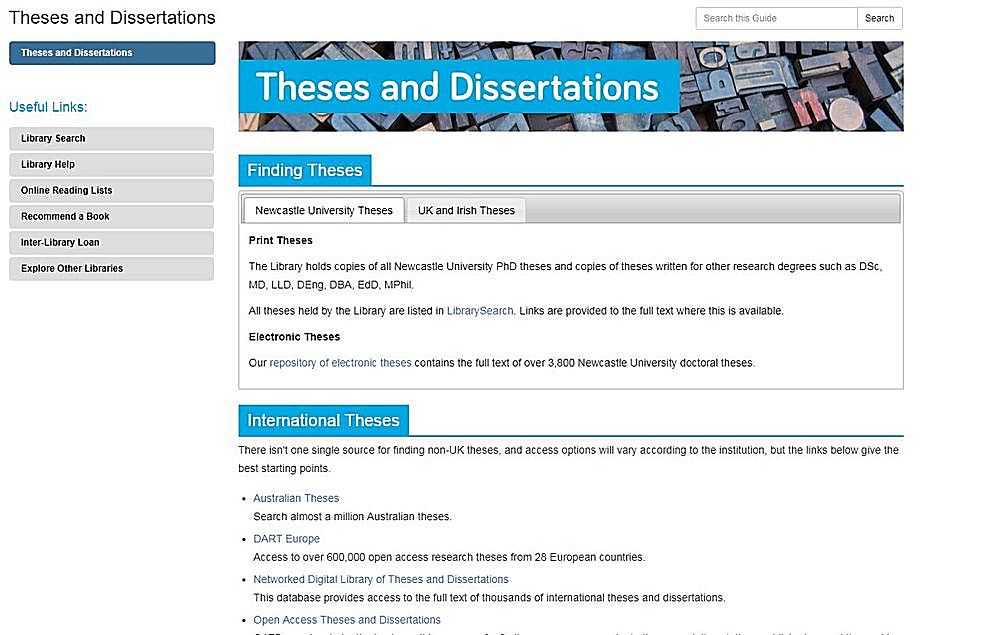
Ethos
Ethos allows you to search the details of 500,000 UK theses from over 120 institutions, from the 1970s to date. The full text of about one fifth of these is available for immediate download to registered users, and in other cases, you may be able to request a copy in digital or other format (for which there may be a charge).
Can’t find the theses you’re looking for? If all else fails, it may be worth checking to see if an institution has its own repository.
OFF THE SHELF – National Poetry Day
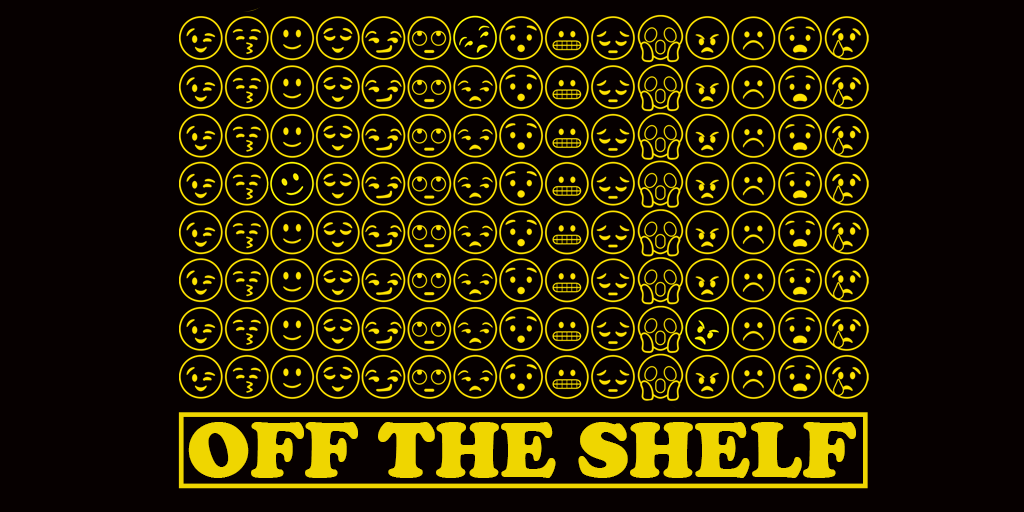
National Poetry Day marks its 25th anniversary this year with a mass participation campaign that highlights poetry’s power to harness the truth about life.
In commemoration of the event, Teaching Fellow Sue Spencer will be returning to the Law Library and Walton Library to take poetry off the shelf and share some meaningful conversations about the truths that really matter.
Drop in for a one-to-one chat and she’ll offer a listening ear and a poem to inspire, soothe and comfort you!
Wednesday 2nd October, 3-5pm
Law Student Common Area, Newcastle Law School
Thursday 3rd October, 4.40-6.30pm
Walton Library, Newcastle University Medical School
No appointments necessary.
Brought to you in conjunction with the Medicine in Literature and Law in Literature Collections.
Welcome to the University Library

Whether you’re a fresher or a final year student we want to help you get the most from your Library. From discovering resources to finding the right study space, to where to go to get help with your coursework. We’ve made a short video so if you’ve only a few minutes to spare it’s all you need to get started….



